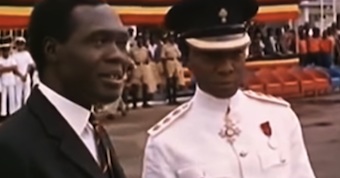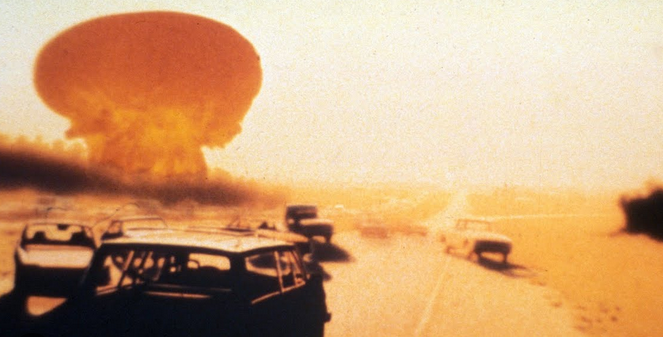Obote and Kabaka Mutesa II. Political marriage of convenience ended badly. Photo: YouTube.
[Letter from New York]
Travelers, explorers and statesmen concluded unanimously that Uganda with its huge natural resource endowments, intelligent, resilient and hard-working people, was poised to play a critical role in various dimensions in the 20th century and beyond. Churchill, who was later to become British Prime Minister, christened Uganda the Pearl of Africa after his visit there at the start of the 20th century.
Uganda was expected together with Kenya to serve as the model for economic integration and ultimately political federation. At the start of Africa’s decolonization, Uganda was identified as the role model. That is why Andrew Cohen the architect of Africa’s decolonization policy was posted to Uganda as governor to test what he had designed in his London colonial office.
Uganda was also singled out including by the World Bank as a country in a favorable position to lead in Africa’s economic growth process because of its endowments. Its geographic location at the heart of Africa and source of the Nile as well as mid-way between Cairo and Cape Town and between the Indian and Atlantic Oceans gave Uganda a unique strategic advantage.
Earlier, at the start of the industrialization process at the end of the Second World War, Uganda was identified as the Detroit of East Africa. The selection of the city of Jinja as the industrial hub wasn’t an accident.
Despite all these promises and opportunities, Uganda has turned out to be a huge disappointment. At the start of independence in the 1960s, Uganda with more resource endowments and a smaller population was ahead of Kenya and Tanzania in many areas; today it trails behind the two neighboring countries including in per capita income. Poverty, inequality of opportunities and wealth, unemployment especially of young people, sprawling urban slums, deteriorating infrastructure, degradation of the environment, corruption, sectarianism and political underdevelopment have become the prominent defining features of today’s Uganda. The Pearl of Africa is in danger of “extinction”. The country has become the sick-man of East Africa.
How do we explain this sad turn of events? Opinions differ depending upon where one is standing and what heir she chooses to pick, and, or emphasize.
Some believe, myself included, that the explanation should begin with the colonial policies of: making one part, Buganda, a special case while neglecting others; indirect rule; functional or regional specializations; and, external interference in Uganda’s internal affairs since the 1950s.
Because Buganda collaborated with Britain in the colonization of other parts of Uganda and in the administration of the colony by sending Baganda administrative agents to other provinces, Buganda was rewarded with land taken mostly from Bunyoro and informally made a state within Uganda protectorate through the devolution of powers to the Mengo traditional administration.
Buganda had a resident as advisor, not a provincial Commissioner and district officers. As one would expect when negotiations began for a unitary independent Uganda, Buganda feared its special status would be lost. Naturally, it resisted these coming changes, resulting in the Kabaka (king) being exiled to Britain. It was this resistance that had prevented the federation of Uganda with Kenya at the start of the colonial rule and later at the start of independence with Kenya and Tanzania in 1963.
Accordingly, independence was delayed until 1962 when Buganda secured a federal status in the unitary state. This marriage of convenience incorporated into the 1962 hybrid constitution sowed the seeds that led to the attack by Milton Obote, who was the executive prime minister, against the palace of the Kabaka, who was also the country’s president. This has been referred to as the 1966 crisis. It also led to the Republican constitution of 1967 that abolished kingdoms and created the post of executive president with enormous powers and strong central administration.
The colonial indirect rule that ended only in name at independence empowered minority ethnic groups or nationalities to govern over majority ethnic groups in an exploitative manner. Negotiations for independence consolidated minority control over the majority as chiefs in indirect rule and their relatives had education and connections enabling them to continue to dominate through politics and civil service to this day.
By and large, independence has benefitted those already privileged under colonial rule. Put differently, they are the ones who negotiated the 1962 constitution that benefitted them disproportionately. They have continued to benefit thereafter under different arrangements.
The functional or geographic colonial specializations or arrangements that designated Buganda and Busoga as economic growth poles, Northern and Eastern regions as recruitment for soldiers, police and prison officers and Western region and West Nile district as cheap labor reserves created inequalities and adverse conditions that have not gone away and still undermine the unity and prosperity of the country especially since the model was not redressed.
Not least, Ugandans have not been given an opportunity to choose their leaders and hold them accountable. Leaders like Ignatius Musazi with vast experience in Uganda politics and beyond were sidelined for various reasons. Yekosofati Engur considered troublesome was eased out. Abu Mayanja the co-founder of Uganda National Congress in 1952 ended up in Buganda administration. William Rwetsiba a seasoned politician was also diverted into civil service. Ben Kiwanuka who led the Democratic Party to pre-independence elections was blocked from forming the independence administration.
New people, young in their thirties and inexperienced were brought in and power handed over to them virtually on a silver platter. Obote replaced Engur and Musazi, Kakonge replaced Magezi and Ibingira replaced Rwetsiba. A year later, Kabaka Mutesa II, also in his thirties, replaced the governor general as president. When Obote digressed from what he had been brought in to do by the British he was eased out and replaced by “gentle giant” Idi Amin. When he too misbehaved he was eased out and replaced by Yusuf Lule who had been picked by foreign interests without even knowing who he was and what he had done before.
The return of Obote in 1980 wasn’t good news in some external quarters and plans to oust him began shortly thereafter and Yoweri Museveni, branded as an “intellectual who picked up the gun” to save Uganda was imposed in 1986. He has collaborated well in the interest of his external sponsors at the expense of native Ugandans whom he claims he conquered and has a right to govern as master and not servant and will choose his successor to continue feasting on the carcass.
Ipso facto, as one can see from the above analysis, these developments created conditions that have resulted in possibly unintended outcomes thereby turning the great promise into a huge disappointment.
The challenge now is to understand these forces, get them out of the way and craft a new paradigm that will turn the promise into real benefits for all Ugandans. Under dedicated and patriotic quality leadership it can be done. Yes, it can and must be done.
What we Ugandans need is to muster the will and launch, for a start, an all inclusive transitional government that maps out a new path to prosperity, national and individual security, dignity and stability for present and future generations of all Ugandans.
Kashambuzi is a New York-based Internatiional Economist and human rights activist.












